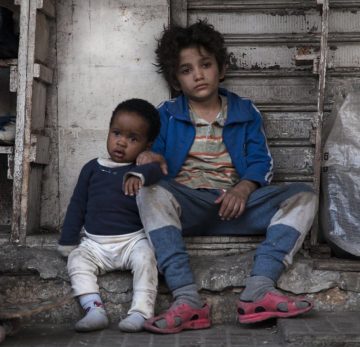
“Your son died as soon as he was born… He does not exist. Even tomato sauce has a date and expiration date. Your son has nothing.”
This haunting line comes from “Capernaüm”, a film directed by Lebanese director Nadine Labaki. “Capernaüm” is based on a real story. The film uses 12-year-old boy Zain suing his parents for giving birth to him as a starting point, and flashbacks to Zain’s earlier experiences uncover the truth about his childhood. Zain’s parents are extremely poor, and struggle to support the children they endlessly give birth to: they even betrayed their eleven-year-old daughter by selling her to the landlord’s son as a child-wife. Hence, Zain is forced to be a mature child from the very beginning: he works and takes care of the children, deals with housework, and even helps his sister face the difficulties of menstruation. He never has any love or cares that all children deserve, and has long known the cruel reality that lies in front of him, unlike the other children from movies that grow up from naive to mature and gradually understand the differences in this world. This film is especially cruel compared to the other films: at the beginning of the film, the child is already a scarred rebel. “If it wasn’t the movie, I never knew such things happen on the planet we live together,” says Fiona P, a junior student at AISG. “No matter how many times I watch it, I still get inspired. “

The production of “Capernaüm” lasted for more than five years. The script was gradually formed during the process. Actors in the film are real-life refugees that have lived in similarly terrible environments, and they are all here to restore the truth. When filming, Labaki did not give specific lines, but instead told the “actors” of the situation and let them play freely; the photographer was only responsible for recording.
Robert Y., a senior at AISG, sympathizes with the children of the movie. “Parents have the obligation to discipline their children, and children also have the right to take their parents to court,” says Robert, “Parents only care about giving birth, regardless of raising, and treat their children as cash cows and free labor. They cannot bring happiness to their children but suffering and torture.”

“Capernaüm”, the movie name, is a region near the Sea of Galilee where Jesus began to preach in the Bible. Many miracles and important events took place here. At the same time, “Capernaüm” also refers to chaos and disaster in Arabic.
Nadine Rabaki, the director, grew up during the civil war that lasted for nearly 15 years from 1975 to 1990 in Lebanon. “I grew up watching the pain and struggle of many,” Nadine Rabaki told the news reporter, noting that Lebanon currently bears 500,000 refugees, many of which are children laborers.

“I don’t want to naively say that movies can change the world, but if they can change your attitude towards these children or your attitude towards your own life, then they can at least change you to a certain extent. When thousands of people can look at these issues from different perspectives, real changes will begin to happen,” Rabaki says. Rabaki believes that movies can change the world, and that happy endings sure can appear in real life, not just in movies.

Regardless of whether you are a person who has experienced a lot, this movie will definitely provide you a whole new perspective of the world. Everyone should watch this movie.